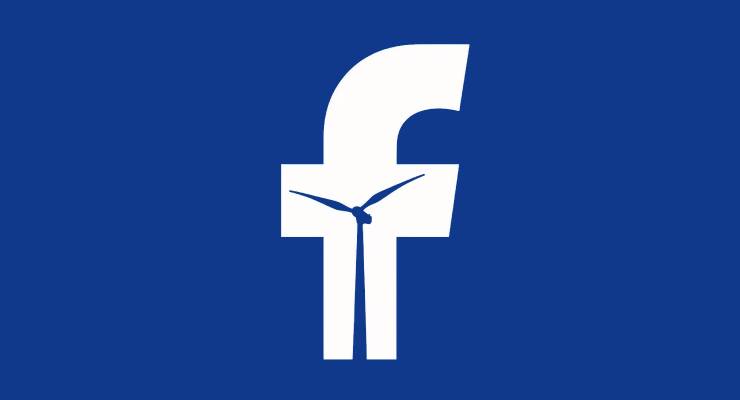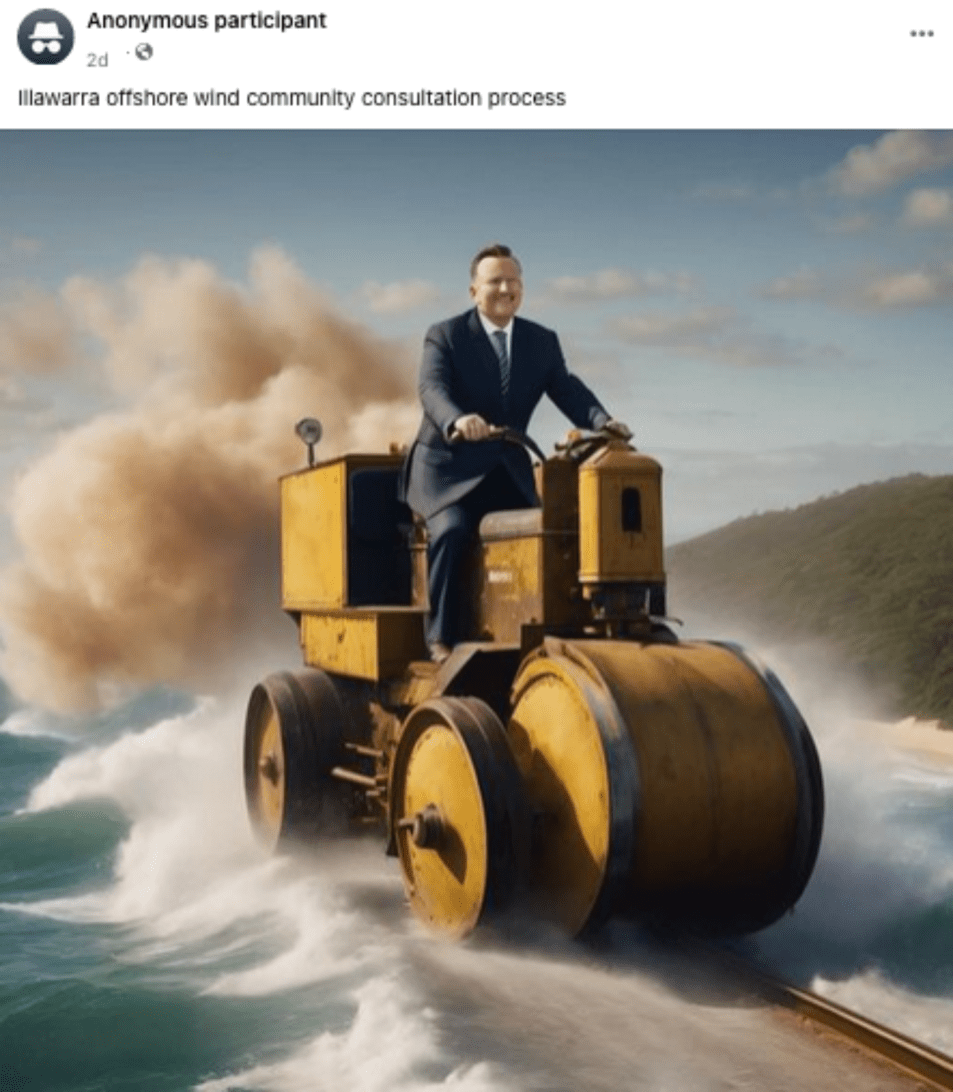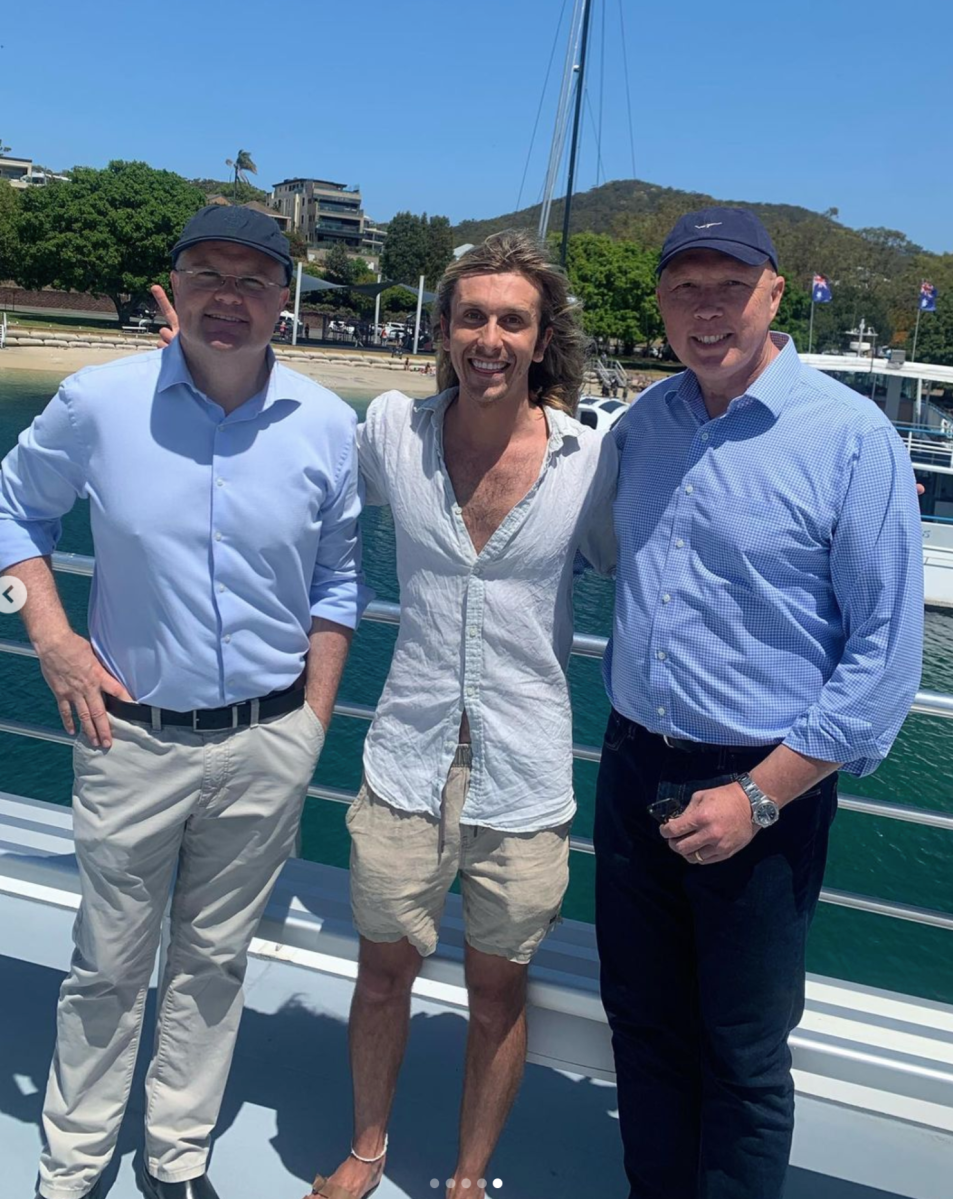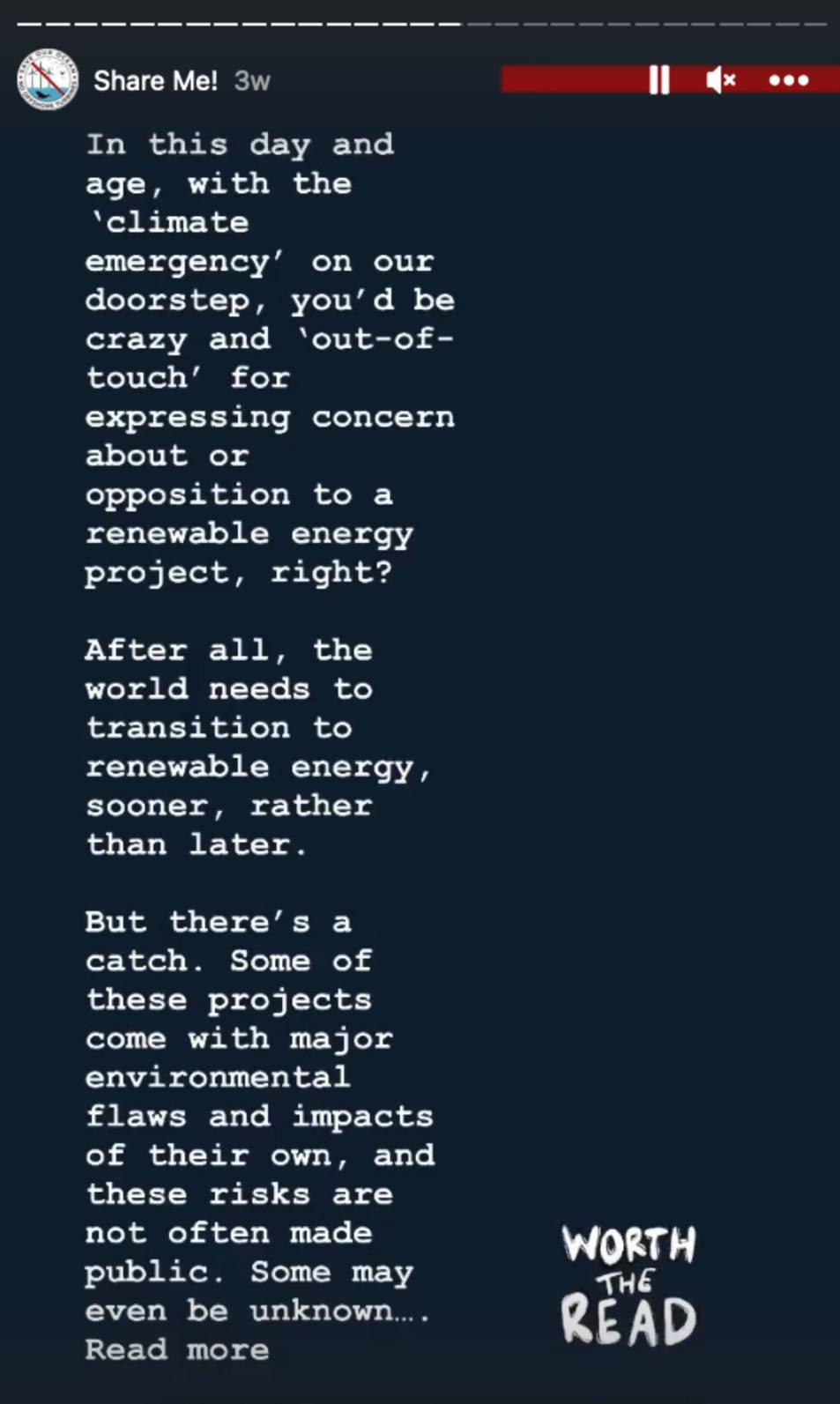
Late last month, surfers paddled out into the water off beaches along the New South Wales coast in protest. Hundreds more hung out on the shore with placards, signs and shirts.
They had come together to show their opposition to offshore wind farms proposed for near the Illawarra region and in Port Stephens. Environmentalists, climate sceptics, local business owners, fishers, independent and minor party politicians and full-blown conspiracy theorists floated and walked alongside each other.
This ad hoc — and at times awkward — coalition organising across the state had found itself online, cobbled together across a constellation of groups and organisations that sprouted up on social media platforms.
The anti-offshore wind farm movement has been effective in growing its supporter base, mobilising against the plans and turning it into a national political issue. So effective it has been that some proponents of the project have wondered whether this campaign is being backed by anti-renewable interests — a claim supported only by scant circumstantial evidence and no smoking gun.
Rather, the opposition to offshore wind farms shows the chaotic, energised and at times murky experience of communities organising online around a culture war issue. Protestors mimic similar battles happening in communities across the world. Bigger players egg them on as they hope to capitalise on issues scrambling traditional political alignments. Local politics has become less local.
The war against wind
In the 2000s and early 2010s, wind farms were a contentious national issue in Australia. Concerns about the environmental and health impacts of turbine noise that were later debunked were mainstream political debates. When the Tony Abbott-led Coalition was in power, backbenchers like Craig Kelly railed against wind power even as their own government promised to support renewables. This mania culminated in a senate inquiry into wind turbines and, subsequently, the creation of the office of the National Wind Farm Commissioner.
As time passed, the hype wore off. Complaints about operational wind farms went from 46 in 2015-16 to 14 in 2021. (The vast majority of complaints received by the office were about proposed developments.) But when Labor took power federally, the issue began to bubble back up, this time focused on offshore proposals.
Both on and offshore wind farms are popular. Recent polling shows a majority supporting their use and fewer than one in five people opposing them. Government plans for offshore wind farm projects off the NSW coast have been on the cards for years, but the proposal and subsequent official designation of a 1,461 square kilometre area as the “Hunter-Central Coast Renewable Energy Zone” across a number of Labor-held seats earlier this year reignited the issue.
Like so many other local issues, it started in neighbourhood Facebook groups. On March 3, a group member of the Port Stephens Noticeboard posted a screenshot of another Facebook post that showed a list of some of the planned projects. “Seems to miss Sydney whilst benefiting foreign owned companies,” they wrote. Other posts about the matter were soon shared in fishing groups or posted by fringe political candidates.
From there, dedicated local community accounts and groups across Facebook and Instagram began to pop up in opposition to the wind farms. Pages like “No Offshore Wind Farm For The Illawarra”, “Love Norah Head” and “No Coastal Wind Farms” became online hubs for organising activity. These groups began gaining hundreds, then thousands of members a week.
The posts in these groups paint a picture of their members’ varied concerns. People post mockups of the turbines that they say will ruin the view from shore. Local company owners who run boat tours or fishing companies worry that the structures will ruin their business. Property values could drop.
Glenna Cluff is a Buff Point resident who runs the Central Coast Turbine Talk, an anti-offshore wind farm Facebook group. She opposes the development because she thinks the region has already done its “fair share of energy production”, citing the region’s coal mining and a local battery project.
“I wear NIMBY [not in my backyard] with pride,” she said to Crikey.
Perhaps the biggest and most emotive fear is that the turbines will impact whales and other marine life. It’s a persistent claim — promoted by everyone from Elon Musk-favoured journalist Michael Shellenberger to former US president Donald Trump — that’s at best unproven and generally dismissed.
To University of Sydney Emeritus Professor of Public Health Simon Chapman, who wrote about Australia’s anti-wind farm movement in his 2017 book Wind Turbine Syndrome: A Communicated Disease, these arguments against offshore wind farms are the same or similar to those used against onshore wind farms a decade or more ago. He says a lot of the arguments didn’t stack up, and disappeared once wind farms were actually built.
“The concerns about whales and fish and dolphins? That was also said about terrestrial wind farms — that the infrasound, subaudible levels, would be heard about migratory whales and would make them crash into cliffs. But it didn’t happen,” he told Crikey over the phone.
Residents in these groups share links to studies that they say support their beliefs, international news articles about wind turbine failures or setbacks and posts from friendly politicians. Sometimes this veers from cherry-picked information to outright misinformation: one article posted by an anti-wind farm page that claimed the Illawarra and Hunter Valley projects were purportedly from the Marine Policy journal turned out to be completely fabricated, The Sydney Morning Herald reported. (No Coastal Wind Farms Port Stephens leader Rhys Westbury posted to his Facebook group last night that all claims need to be cited to “mitigate danger of allowing information that isn’t factually backed by sources to creep in and undermine the solid work we’ve been creating”.)
Posts show how anti-wind farm activism is being influenced by connections with other groups. One group admin posted a quick shout-out to the “other aligned Face book [sic] pages” and welcomed people from other groups. A new group, Coalition Against Offshore Wind Farm Community Forum, was started at the beginning of October and quickly gained thousands of participants from up the NSW coast. In it, members frequently share posts from other groups up the coast as motivation and inspiration from their own organising. While most of these intergroup shares are domestic, some members have clearly connected with international anti-wind farm groups and crosspost their content to the group as well. In a Facebook group called “The Illawarra (Wollong, Shellharbour Kiama) Wind Farm Chat”, an admin repeatedly posts content from a similar group from New Jersey where a $4 billion wind farm project was just cancelled.
There’s a feeling of suspicion that permeates the movement. Many of the people opposing the wind farms don’t trust the companies involved with the project because they’re foreign-owned (“Do we really want to lease and give control of the Australian seabed to international investors?” one post reads). Group participants are scathing of the government’s consultation process and believe it’s rigged against them. They accuse Bowen and their local members of running a “misinformation war” in support of the wind farms. One anonymous group member even shared an AI-generated image of a giant Environment Minister Chris Bowen driving a steamroller down a beach: “Illawarra offshore wind community consultation process,” they dryly captioned the image.

Local publications are pilloried for being pro-wind farm for reporting on the public tussle over the plans. When an Illawarra Mercury reporter posted in No Offshore Wind Farm For The Illawarra to ask if someone would speak to him about their concerns about how the development will affect property values, group members piled on him. “Don’t trust the Mercury. They have been bought,” one member replied.
This speculation sometimes graduates into conspiracy theories about the involvement of the United Nations or other bogeymen, although that is a minority of the content shared. Anti-vaccine conspiracy theorists and sovereign citizens have also thrown their support behind the anti-wind farm organising with figures like Dave ‘Guru’ Graham and the Australia Project promoting and attending their rallies.
Online support translates into offline organising
These online spaces and accounts are hotbeds of activity. In them, members encourage submissions to the government, coordinate appearances at consultation sessions, post pro-windfarm social media posts and articles to encourage critical comments and share a lot of anti-wind farm content.
Anti-wind farm groups have organised rallies, paddle-outs and community stalls. One of a handful of petitions received more than 11,000 signatures. A fundraiser for their movement has raised nearly $9,000. A billboard featuring an illustration of a dead, beached whale in front of an offshore wind farm appeared in Port Stephens.
It’s also caught the eye of state and federal politicians. Federal Liberal Party’s Dan Tehan, One Nation NSW MLC Tania Mihailuk and Liberal-turned-independent MP Gareth Ward have all spoken out against the project. But their biggest opponents have been federal shadow climate change and energy minister Ted O’Brien, shadow treasurer Angus Taylor and Opposition Leader Peter Dutton. On top of repeated comments to the media, Dutton and Taylor even travelled to the NSW mid-coast to meet with residents opposed to the wind farms.

While much of it is grassroots, parts of the movement show a surprising level of sophistication. An anonymous Illawarra-focused group called No Offshore Turbines maintains a list of reasons against the project on its website and its slickly-designed Instagram in a way that’s meant to encourage sharing. Lifting text from sources as diverse as ABC News reporting to a 2013 article from a United States-based group that Wikipedia cites as being “often described as a front for the fossil fuel industry” the Institute for Energy Research, No Offshore Turbines has provided more than 7,000 words of “tips” to use in submissions to the Department of Climate Change, Energy, the Environment and Water’s consultation about the project.
In response to a request for an interview, someone using the No Offshore Turbines — Illawarra Instagram account declined and suggested contacting the Coalition Against Offshore Wind instead. One document posted to No Offshore Turbines’ website includes metadata listing Sharon Bent as its author. A Bulli resident, Bent has appeared in various media reports voicing her displeasure with the project. She told Crikey that she only has “indirect” involvement with the group, which has been sharing IT resources, and declined to say who authored the document.

Who’s behind it all?
This sophistication has led to suspicion — except this time from the pro-wind farm side. In the much smaller group “YES to Wind Farms Collective, Central Coast, Hunter, Port Stephens”, people suspect the groups organising against wind farms are being backed by bigger players like they are in the United States. The group’s description claims “There is a coordinated campaign, likely funded by fossil fuel interests, to stop our shift to renewables”.
Their evidence: one anti-windfarm Facebook group was founded by someone whose LinkedIn lists them as a marketing manager for Glencore Coal. Glencore declined to comment and that person did not respond to an Instagram comment. Another group has an admin whose LinkedIn lists them as working for Wollongong Coal (they did not respond to a LinkedIn message). Members also discovered that Cluffe had once organised a Liberal Party Women’s Council virtual meeting. Cluffe told Crikey that her opposition is a completely personal view and has nothing to do with her party membership.
The narrative that it sketches — fossil fuel and political parties are the real puppet masters behind this campaign against offshore wind farms and that they’re tricking residents into opposing them — is compelling. But it’s far less plausible than the alternative, simpler explanation: that working for mining companies or being a Liberal Party member means that you’re more likely to oppose offshore wind farms. Likewise, an explanation for the signs and shirts that have popped up is found in Facebook posts thanking local shops for their donations.
From the outside, the rapid growth and capable mobilising of the anti-wind farm movement in these coastal NSW communities has led some to question whether it could be the result of authentic grassroots organising. But their digital footprints show how this surge of interest and activity organically grew from an odd bloc of residents opposed to the projects. Emboldened by politicians and inspired by a network of similar groups, the pushback against offshore wind farms is a taste of what more and more local politics will look like in the future.
How effective, and accurate, is online activism? Let us know your thoughts by writing to letters@crikey.com.au. Please include your full name to be considered for publication. We reserve the right to edit for length and clarity.








Remember Terry McCrann (Herald Sun business editor) and his “Stop This Madness” campaign supporting the loopy anti-wind farm Waubra Group – back around 20 odd years ago .
The current loopiness is maintained by the deranged and demented Sky Noise After Dark crew……led by the Angry Abbott puppeteer Peta Credlin and her fellow string-puller hubby.
who, never forget, boasted about Abbott’s opposition to the Great Big Carbon Tax having been a Great Big Lie
https://www.sbs.com.au/news/carbon-tax-just-brutal-politics-credlin
That ‘Lie’ was imported and borrowed from the US fossil fuel campaign of the ’90s vs. the Clinton administration’s mooted carbon pricing.
Easier than that, key person cited in ‘2013 article from a United States-based group that Wikipedia cites as being “often described as a front for the fossil fuel industry”’ includes, who else, Charles Koch behind Atlas or Koch Network of think tanks, locally inc. IPA, CIS etc..
Also allegedly behind much astroturfing of seemingly disparate campaigns e.g. faux environmental but Malthusian greenwashing of immigration or population, avoiding science and deflecting from fossil fuels while delaying with competitive threats with support of RW MSM and ‘owning’ the LNP.
Sounds like a textbook case of astroturfing, and you can bet the fossil fuel industry knows the textbooks on this inside-out.
Yes and no. The point I took from the analysis was that it showed the ways in which a group of somewhat disparate people could stitch themselves together via anxieties, credulity and just enough (lack of) education to be a danger to others like themselves. Sort of like being able to watch a pitchfork wielding mob assemble itself in slow motion. But yes the industry and populist politicians know all about seeding, feeding and leading such mobs. However, inasmuch as the medium of mob formation has changed via social media the tactics will also be evolving. All this is important to keep an eye on for we pro-world governmenter Thetan descendents planning to steal everyone’s precious bodily fluids…
If you follow DeSmog, Democracy UK, ByLine Times and good US media, that’s the modus operandi for ‘architecture of influence’, see Jane Mayer ‘Dark Money’.
Any cause that muddies the water ,interdicts , distracts and delays from the transition to renewables will be embraced by the Fossil Fuel Lobby . Dutton and Co can be relied upon to do their duty ,from debunking offshore wind farms to fully supporting unproven Nuclear Power proposals . In short , anything that half serves their grand strategy will do .
Perhaps we should just keep burning coal in these idiots backyards
Useful but keep in mind the same organised ratbaggery is being run against every renewable project’s upgraded powerline network. Out in the country it’s bizarre to find the Nationals arguing against power lines! Or at least flirting with nimby/antimagnetic effect rwnjs and urging them to oppose “Labor’s” power grid. Ludicrous claims that a power line across poor cattle country (cleared and degraded) will ruin livelihoods and harm the poor wildlife. This from folks who bait “wild dogs”. The cynicism of the Ntas is…well, pretty much par for the course.